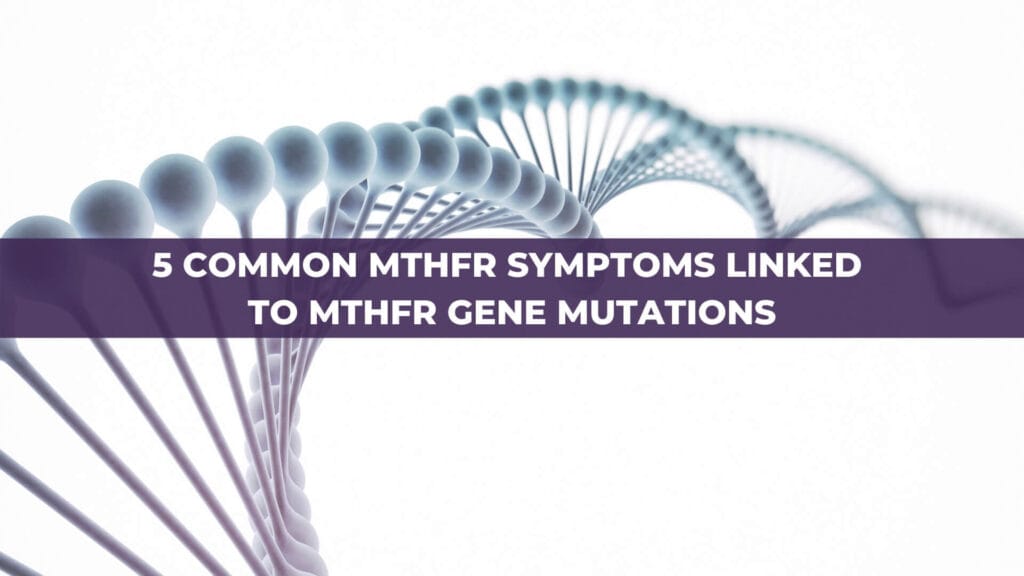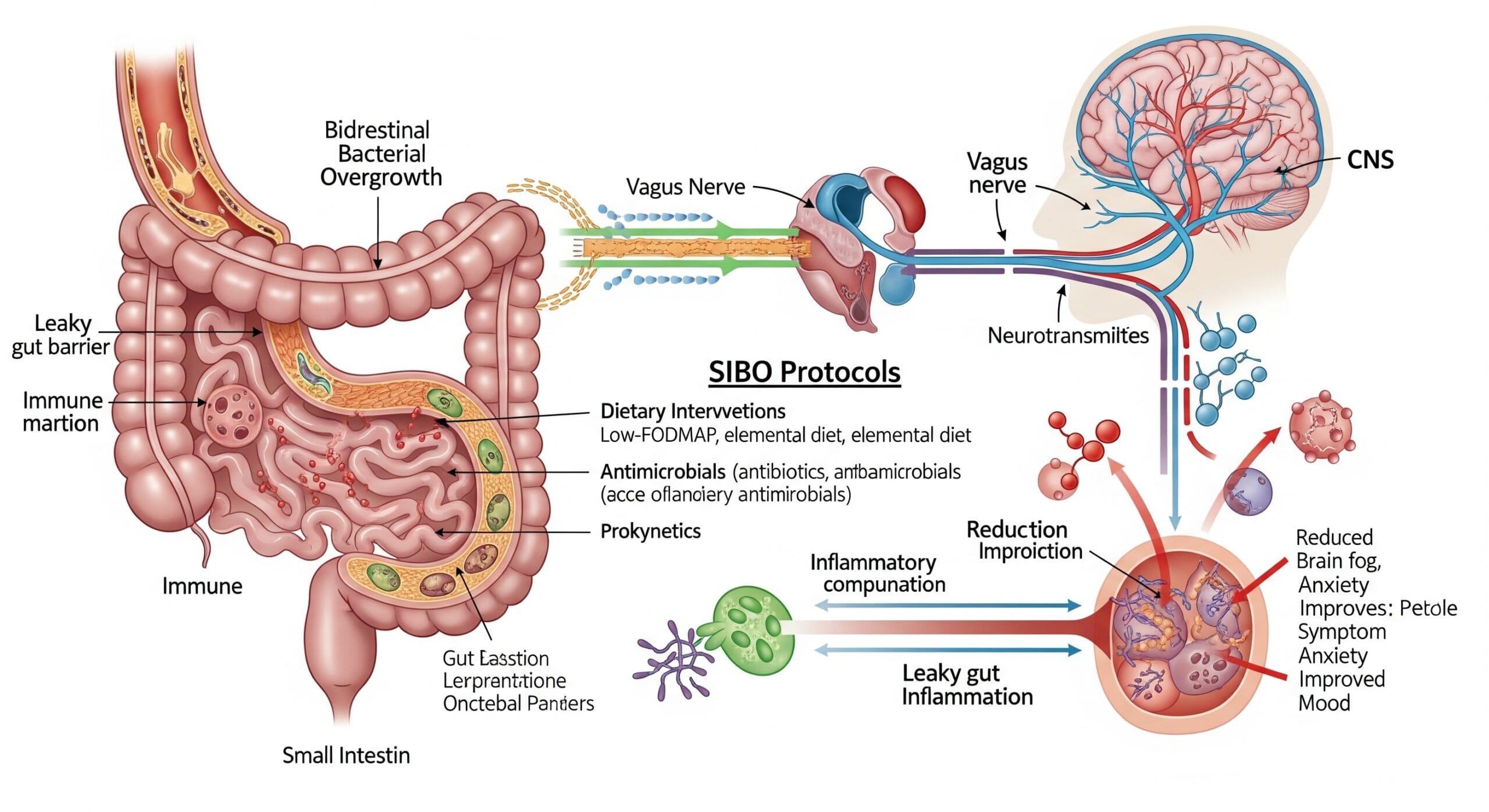If you’ve been told you have an MTHFR gene mutation, you may be wondering what it means for your health — and whether your symptoms could be linked. Research shows that MTHFR gene mutations can affect folate metabolism and methylation, two processes vital for DNA repair, hormone balance, detoxification, mental health, and fertility.
Because methylation impacts so many systems, MTHFR gene mutation symptoms can vary widely. Some people experience only mild issues, while others struggle with cardiovascular problems, reproductive challenges, or mental health concerns.
The good news? With targeted lifestyle and dietary strategies, you can reduce many >MTHFR mutation symptoms and improve your overall health. Let’s look at the most common ones — and how to manage them.
What Is an MTHFR Gene Mutation?
The MTHFR gene (methylenetetrahydrofolate reductase) is responsible for converting folate into its active form, methylfolate. Methylfolate helps power the methylation cycle, which regulates:
- Homocysteine metabolism
- Neurotransmitter production (serotonin, dopamine, norepinephrine)
- Hormone regulation
- Detoxification and antioxidant production
- DNA synthesis and repair
When the MTHFR gene has a variant (like C677T or A1298C), the enzyme works less efficiently. This can reduce methylation, contributing to a wide range of MTHFR gene symptoms.
5 Common MTHFR Symptoms
1. Cardiovascular Problems
Elevated homocysteine is one of the hallmark issues linked to MTHFR gene mutation symptoms. When homocysteine builds up, it increases the risk of cardiovascular disease. Symptoms and conditions include:
- High blood pressure
- Stroke
- Heart attack
- Deep vein thrombosis (DVT)
2. Pregnancy Complications and Infertility
Active folate is essential for healthy DNA synthesis during conception and pregnancy. If your MTHFR gene mutation reduces folate metabolism, the risk of complications rises. Symptoms and outcomes can include:
- Recurrent miscarriage
- Difficulty conceiving
- Neural tube defects (spina bifida, cleft lip/palate)
- Down syndrome
- Preeclampsia and pregnancy hypertension
If you’re planning pregnancy, supporting methylation and folate pathways is critical. [Join our FREE 10-Day ‘MTHFR in Preconception’ Email Course!]
3. Oestrogen Dominance
Methylation plays a central role in breaking down and clearing oestrogen. Impaired function can lead to MTHFR mutation symptoms related to hormone imbalance, such as:
- Fibrocystic breasts and ovarian cysts
- Mood swings and PMS
- Irregular or heavy periods
- Endometriosis
- Uterine fibroids
4. Mental Health Concerns
Methylation helps produce neurotransmitters like serotonin and dopamine. Reduced activity due to an MTHFR mutation can worsen mental health issues. Symptoms include:
- Anxiety
- Depression
- Bipolar disorder
- ADD/ADHD
- Migraines
- Brain fog or poor concentration
5. General MTHFR Symptoms
Beyond the systems above, many people with an MTHFR gene mutation report broader symptoms linked to inflammation, detoxification issues, and low B-vitamin activity:
- Chronic fatigue
- Eczema, asthma, hives, and allergies
- Chronic inflammation or pain
- Low immunity and frequent illness
- High homocysteine, low B12, or elevated liver enzymes
Medications That Can Worsen MTHFR Gene Symptoms
Certain drugs deplete folate or B12, reducing your body’s methylation capacity and aggravating MTHFR mutation symptoms. These include:
- Antacids
- Metformin
- Oral contraceptives
- Methotrexate
- High-dose niacin
- Sulfa drugs (e.g., Bactrim)
- Nitrous oxide (“laughing gas”)
Improving Your Health With an MTHFR Gene Mutation
If you suspect your health issues are linked to an MTHFR mutation, here are practical steps to support your body:
- Optimise your diet → Prioritise natural folate (leafy greens, avocado, legumes), choline (eggs, salmon, liver), and B12-rich foods (meat, fish, eggs). Avoid synthetic folic acid.
- Check your nutrients → Work with a practitioner to assess B12, folate, and homocysteine levels.
- Support detoxification → Eat antioxidant-rich foods (berries, green tea, cruciferous veg) and reduce exposure to toxins.
- Review medications → If you’re on drugs that deplete folate/B12, discuss alternatives with your doctor.
- Supplement carefully → Methylfolate and methyl-B12 can be helpful, but should be introduced cautiously and at the right dose.
Want step-by-step guidance? Our MTHFR Basics: Lifestyle and Dietary Advice Course shows you exactly what to eat, what to avoid, and how to support methylation naturally.
Other MTHFR Symptoms by Body System
Neurological Symptoms: Brain Fog, Anxiety, and Irritability
MTHFR gene mutations can significantly impact your nervous system because methylation is essential for producing neurotransmitters like serotonin, dopamine, and norepinephrine — the chemical messengers that regulate mood, focus, and mental clarity.
Common neurological MTHFR symptoms include:
- Brain fog and poor concentration — difficulty focusing, remembering details, or processing information
- Anxiety and panic attacks — heightened stress response, racing thoughts, or constant worry
- Irritability and mood swings — feeling easily frustrated, emotionally reactive, or “on edge”
- Depression — persistent low mood, lack of motivation, or feelings of hopelessness
- Migraines and tension headaches — often triggered by stress, hormonal changes, or certain foods
Why this happens: When your MTHFR enzyme doesn’t work efficiently, your body struggles to convert folate into methylfolate. This creates a cascade of problems for your brain chemistry.
The COMT connection: Another enzyme affected by poor methylation is COMT (catechol-O-methyltransferase), which breaks down and clears neurotransmitters like dopamine and adrenaline. COMT requires methyl groups to function, so when MTHFR mutations reduce methylation, neurotransmitters can accumulate rather than being efficiently cleared. This creates a buildup that leaves you feeling overwhelmed, easily angered, burnt out, and unable to cope with normal stress levels — often described as feeling “wired but tired” or emotionally flooded.
Management tip: Check your COMT enzyme gene. If it is too fast, you may need more folate than someone who has a genetically “slow” COMT enzyme. Some patients need 500mcg of daily folate to improve mental health symptoms, whilst others need as high as 15000mcg. Consider working with a practitioner to test neurotransmitter levels, methylation and homocysteine to figure out what your ideal folate dose is.
Cardiovascular Symptoms: High Homocysteine and Heart Palpitations
One of the most well-researched consequences of MTHFR gene mutations is elevated homocysteine — an amino acid that, when too high, damages blood vessel walls and increases cardiovascular risk.
Common cardiovascular MTHFR symptoms include:
- Elevated homocysteine levels — often discovered through blood tests
- High blood pressure — persistent hypertension without clear cause
- Heart palpitations — irregular heartbeat, racing heart, or fluttering sensations
- Blood clots — increased risk of deep vein thrombosis (DVT) or pulmonary embolism
- Stroke or heart attack risk — particularly in younger individuals with family history
- Poor circulation — cold hands and feet, numbness, or tingling
Why this happens: When methylfolate is attached to homocysteine, it is converted into methionine (a beneficial amino acid). The MTHFR enzyme creates the methylfolate. When this conversion is impaired due to reduced methylfolate, homocysteine accumulates in the blood, causing inflammation and oxidative stress in blood vessels.
Management tip: Prioritise B-vitamin-rich foods and supplements (especially B6, B12, and folate), reduce processed foods, manage stress, and have your homocysteine levels tested regularly. Levels above 15 μmol/L may indicate methylation issues. Aim for homocysteine 7 μmol/L.
Hormonal Symptoms: PMS, Infertility, and Low Energy
Methylation plays a crucial role in hormone metabolism, particularly oestrogen breakdown. When MTHFR gene mutations impair this process, hormonal imbalances can develop, leading to a cascade of symptoms.
Common hormonal MTHFR symptoms include:
- Severe PMS — mood swings, breast tenderness, bloating, and irritability before periods
- Irregular or heavy periods — unpredictable cycles or excessive menstrual bleeding
- Infertility and difficulty conceiving — reduced egg or sperm quality or implantation issues
- Recurrent miscarriages — often linked to elevated homocysteine and poor methylation
- Chronic fatigue and low energy — feeling exhausted even after adequate sleep
- Thyroid dysfunction — sluggish metabolism, weight gain, or cold sensitivity
- Fibrocystic breasts and ovarian cysts
- Endometriosis and uterine fibroids
Why this happens: Poor methylation leads to oestrogen dominance (too much oestrogen relative to progesterone) because your body can’t efficiently break down and eliminate used hormones. This creates a hormonal imbalance that affects energy, mood, and reproductive health.
Active folate is also essential for healthy DNA synthesis during conception and pregnancy. If your MTHFR gene mutation reduces folate metabolism, the risk of pregnancy complications rises significantly, including neural tube defects (spina bifida, cleft lip/palate), Down syndrome, preeclampsia, recurrent losses and more.
Management tip: Eat cruciferous vegetables (broccoli, cauliflower, Brussels sprouts) to support oestrogen detoxification. Ensure adequate B12 and folate intake, and consider additional supplements, strategies or herbal support under professional guidance.
If you’re planning pregnancy, supporting methylation and folate pathways a minimum of 3 months prior to conception is critical.
Digestive Symptoms: IBS, Bloating, and Food Sensitivities
While less commonly discussed, MTHFR gene mutations can contribute to digestive issues through impaired detoxification, inflammation, and histamine metabolism.
Common digestive MTHFR symptoms include:
- IBS (Irritable Bowel Syndrome) — alternating constipation and diarrhea, cramping, or abdominal pain
- Chronic bloating and gas — feeling uncomfortable or distended after meals
- Food sensitivities and intolerances — reactions to gluten, dairy, histamine-rich foods, or FODMAPs
- Leaky gut syndrome — increased intestinal permeability leading to systemic inflammation
- Nausea or acid reflux — particularly after eating certain foods
- Nutrient malabsorption — low B12, folate, or iron despite adequate dietary intake
Why this happens: Methylation supports detoxification pathways in the liver and helps break down histamine. When these processes are compromised, toxins and histamine accumulate, triggering inflammation in the gut lining and increasing sensitivity to foods.
Important: Poor gut health can cause methylation issues by inhibiting the uptake of methylfolate into the methionine cycle. You may need to reduce LPS producing gut bacteria, restore B12 and glutathione and reduce inflammation before supplementing with folate. This is essential if you have ever reacted negatively to B-vitamin supplements.
Management tip: Whilst you support gut health, consider a low-histamine or elimination diet if food sensitivities are severe, and work with a practitioner to heal your gut lining and methylation in a step-by-step process
Frequently Asked Questions About MTHFR Symptoms
What are the signs of MTHFR gene mutation?
The signs of an MTHFR gene mutation vary widely because methylation affects multiple body systems. Common indicators include:
- Elevated homocysteine levels (above 10-15 μmol/L)
- Chronic fatigue and low energy
- Anxiety, depression, or brain fog
- Hormonal imbalances (PMS, infertility, irregular periods)
- Recurrent miscarriages or pregnancy complications
- Cardiovascular issues (high blood pressure, blood clots)
- Digestive problems (IBS, bloating, food sensitivities)
- Chronic inflammation or autoimmune conditions
Many people discover they have an MTHFR mutation after experiencing unexplained health issues or through genetic testing ordered by their healthcare provider.
How do you know if you have MTHFR symptoms?
MTHFR symptoms often overlap with other health conditions, making them difficult to identify without testing. However, you might suspect an MTHFR mutation if you:
- Have a family history of heart disease, stroke, or blood clots
- Experience multiple unexplained symptoms across different body systems
- Have elevated homocysteine or low B12/folate levels on blood tests
- Struggled with infertility, miscarriages, or pregnancy complications
- Don’t respond well to standard treatments for anxiety or depression
- Have chronic health issues that improve with methylated B vitamins
The most definitive way to know is through genetic testing (blood test or saliva test) that identifies MTHFR variants like C677T or A1298C.
Can MTHFR cause anxiety and fatigue?
Yes, MTHFR gene mutations can contribute to both anxiety and fatigue through several mechanisms:
Anxiety: Impaired methylation reduces your body’s ability to produce adequate serotonin, dopamine, and GABA — neurotransmitters that regulate mood and stress response. This can lead to heightened anxiety, panic attacks, racing thoughts, and difficulty relaxing.
Fatigue: Poor methylation affects energy production at the cellular level by disrupting mitochondrial function and reducing B-vitamin activity. Additionally, elevated homocysteine causes oxidative stress and inflammation, both of which drain energy reserves.
Many people with MTHFR mutations report that their anxiety and fatigue improve significantly when they support methylation through diet, lifestyle changes, and appropriate supplementation with methylfolate and methyl-B12.
When should you test for MTHFR?
Consider testing for MTHFR gene mutations if you experience:
- Recurrent pregnancy loss — two or more miscarriages
- Infertility or difficulty conceiving — unexplained reproductive challenges
- Family history of cardiovascular disease — especially stroke, heart attack, or blood clots at young ages
- Elevated homocysteine levels — discovered through routine blood work
- Treatment-resistant mental health issues — anxiety or depression that doesn’t respond to standard medications
- Multiple unexplained symptoms — chronic fatigue, brain fog, hormonal imbalances, digestive issues
- Personal or family history of blood clots — DVT, pulmonary embolism, or clotting disorders
- Planning pregnancy — especially if you have risk factors for neural tube defects
MTHFR testing is a simple blood or saliva test available through your doctor or direct-to-consumer genetic testing services. If you test positive, work with a knowledgeable practitioner to develop a personalized management plan.
How to Improve Your Health With an MTHFR Gene Mutation
If you suspect your health issues are linked to an MTHFR mutation, here are practical, evidence-based steps to support your body and reduce symptoms:
1. Optimise Your Diet
Prioritize whole foods rich in natural folate, B vitamins, and methylation cofactors:
- Folate-rich foods: Leafy greens (spinach, kale, romaine), asparagus, broccoli, Brussels sprouts, avocado, legumes (lentils, chickpeas, black beans)
- Choline sources: Eggs, salmon, liver, beef, chicken, cauliflower
- B12-rich foods: Meat, fish, shellfish, eggs, dairy products
- B6 sources: Poultry, fish, potatoes, chickpeas, bananas
- Magnesium: Pumpkin seeds, almonds, spinach, dark chocolate, avocado
Critically important: Avoid synthetic folic acid found in fortified foods and standard multivitamins. For people with MTHFR mutations, synthetic folic acid can actually block folate receptors and worsen symptoms.
2. Check Your Nutrient Levels
Work with a knowledgeable practitioner to assess your methylation status through blood tests:
- Homocysteine (optimal: below 10 μmol/L)
- Vitamin B12 (active B12 or methylmalonic acid for accuracy)
- Folate (serum and red blood cell folate)
- Vitamin B6
- Vitamin D
- Thyroid function (TSH, free T3, free T4)
3. Support Detoxification Naturally
Reduce your toxic burden and support your body’s natural detoxification pathways:
- Eat antioxidant-rich foods (berries, green tea, turmeric, cruciferous vegetables)
- Drink plenty of filtered water
- Reduce exposure to environmental toxins (pesticides, plastics, harsh cleaning products)
- Support liver health with bitter greens, beets, and dandelion root tea
- Practice regular sweating through exercise or sauna use
- Ensure regular bowel movements (fiber, probiotics, adequate hydration)
4. Review Your Medications
If you’re taking drugs that deplete folate or B12, discuss alternatives or supplementation strategies with your doctor. Never stop prescribed medications without medical supervision, but do advocate for your methylation health.
5. Supplement Carefully and Strategically
Methylfolate (active folate) and methyl-B12 can be incredibly helpful for people with MTHFR mutations, but they should be introduced cautiously and at appropriate doses based on your individual needs.
Important considerations:
- Start with low doses and increase gradually
- Work with a practitioner experienced in MTHFR management
- Consider supporting cofactors (B6, magnesium, zinc)
- Monitor how you feel — some people experience overmethylation symptoms if doses are too high or there is a ‘methylation block’
- Quality matters — choose pharmaceutical-grade supplements from reputable brands
Get 1-on-1 support with one of our expert practitioners and get a personalised plan
Final Thoughts
An MTHFR gene mutation can feel overwhelming, especially when you’re dealing with varied and confusing symptoms. But the truth is, with the right diet and lifestyle changes, many MTHFR mutation symptoms can improve significantly.
The key is understanding how methylation works, identifying your personal triggers, and applying strategies consistently. With knowledge and support, you can take back control of your health.
Ready to get started? [Join the MTHFR Basics Course] today and learn how to manage your gene mutation with confidence.
References
- Frosst, P. et al. (1995). A candidate genetic risk factor for vascular disease: a common mutation in methylenetetrahydrofolate reductase. Nature Genetics. PubMed
- Morris, M. S. et al. (2005). The MTHFR C677T polymorphism, folate, vitamin B12, and homocysteine: associations with depression. American Journal of Clinical Nutrition. PubMed








